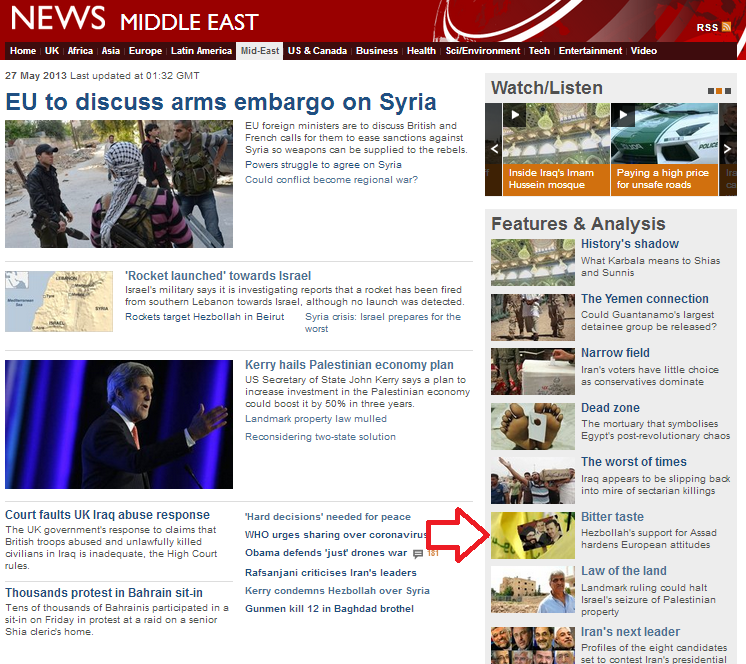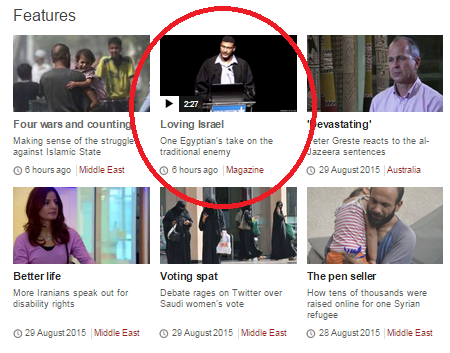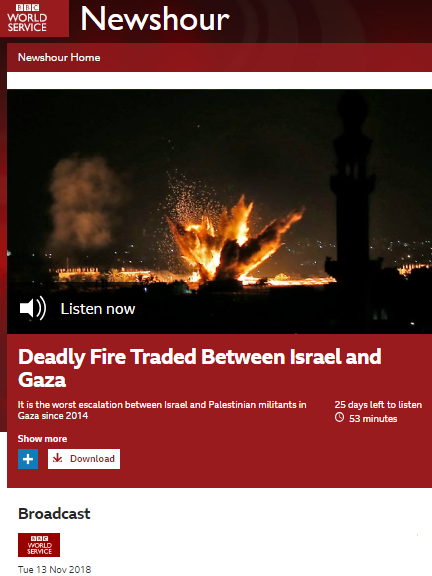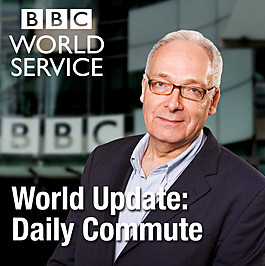“Bitter taste”. That was the curious choice of wording used to headline a May 23rd article about Hizballah by BBC diplomatic/defence correspondent Jonathan Marcus in the ‘Features & Analysis’ section of the Middle East page of the BBC News website.
A click on the link leads to a report titled “Europe’s stance on Hezbollah hardens” which is illustrated with an image equally bizarrely captioned:
“Hezbollah’s embrace of Assad regime during the bitter Syrian conflict has hardened European hearts against it” [emphasis added]
The use of such emotion-orientated language may well cause readers to wonder if they are reading about reactions to a candidate in a phone-in TV talent contest rather than evidence-based assessments of an international terror organization.
Disappointingly for any readers seeking accurate information on the subject of Hizballah, Marcus chooses to perpetuate the myth of a separate ‘military wing’ to that organization.
“The British government is pushing its European partners to designate the military wing of Hezbollah as a terrorist entity. This comes in the wake of the organisation’s role in an attack on Israeli tourists in Bulgaria and the recent conviction of a Hezbollah operative in Cyprus.”
“Up to now, only Britain and the Netherlands have placed the military wing of Hezbollah on their national terrorism blacklists. Germany now seems more willing to designate Hezbollah’s military arm, and this has given some impetus to the British move.”
In fact, the 2004 designation of Hizballah as a terrorist organization by the Netherlands rightly makes no distinction between its ‘military’ and ‘political’ wings, as shown on page 19 of the General Intelligence and Security Service Report for that year.
“Investigations have shown that Hezbollah’s terrorist wing, the Hezbollah External Security Organisation, has been directly and indirectly involved in terrorist acts. It can also be concluded that Hezbollah’s political and terrorist wings are controlled by one co-ordinating council. This means that there is indeed a link between these parts of the organisation. The Netherlands has changed its policy and no longer makes a distinction between the political and terrorist Hezbollah branches. The Netherlands informed the relevant EU bodies of its findings. “
Of course Hizballah itself is perfectly aware of the potential effects of designation upon the organisation as a whole, as expressed by Hassan Nasrallah in 2005.
“[EU designation] would dry up the sources of finance, end moral, political and material support, stifle voices, whether they are the voices of the resistance or the voices which support the resistance, pressure states which protect the resistance in one way and another, and pressure the Lebanese state, Iran and Iraq, but especially the Lebanese state, in order to classify it as a state which supports terrorism.”
Bizarrely, the BBC’s diplomatic/defence correspondent only now seems to have discovered the fact that Hizballah is an Iranian franchise – a fact which has been obvious to most other people with any knowledge of the Middle East for years.
“Hezbollah seems to have thrown in its hand with President Assad, confirming the views of many of its critics that it is playing out a wider game plan inspired by Tehran.”
The outstanding feature of Marcus’ article, however, is its adoption of the lexicon and narrative of the terrorists he writes about. [emphasis added]
“The British move to list Hezbollah’s military wing comes as the image of the Lebanese organisation – long hailed in the region as one of the principal resistance forces against Israel – is coming under strain.”
Marcus does not take the trouble to explain to his readers what lies behind the romantic-sounding propaganda slogan “resistance”, as laid out in Hizballah’s original 1985 “open letter”.
“We see in Israel the vanguard of the United States in our Islamic world. It is the hated enemy that must be fought until the hated ones get what they deserve. This enemy is the greatest danger to our future generations and to the destiny of our lands, particularly as it glorifies the ideas of settlement and expansion, initiated in Palestine, and yearning outward to the extension of the Great Israel, from the Euphrates to the Nile.
Our primary assumption in our fight against Israel states that the Zionist entity is aggressive from its inception, and built on lands wrested from their owners, at the expense of the rights of the Muslim people. Therefore our struggle will end only when this entity is obliterated. We recognize no treaty with it, no cease fire, and no peace agreements, whether separate or consolidated.
We vigorously condemn all plans for negotiation with Israel, and regard all negotiators as enemies, for the reason that such negotiation is nothing but the recognition of the legitimacy of the Zionist occupation of Palestine. Therefore we oppose and reject the Camp David Agreements, the proposals of King Fahd, the Fez and Reagan plan, Brezhnev’s and the French-Egyptian proposals, and all other programs that include the recognition (even the implied recognition) of the Zionist entity.” [emphasis added]
Neither did the revised 2009 Hizballah “manifesto” demonstrate any change in its attitudes towards Israel:
“Similarly, twenty-four years of organizational development and political integration have not led to any shift in Hizbollah’s fervent opposition to any negotiated agreement between Israel and the Arab world. The group continues in its “absolute refusal to [accept] the very principle of the choice of settlement with the Zionist entity, which is based on recognizing the legitimacy and existence of this entity and giving up to it the lands it usurped from Arab and Islamic Palestine.” “
The move by EU countries to finally designate Hizballah as a terrorist organization is, of course, both necessary and long overdue. Whilst Jonathan Marcus’ analysis of the reasons behind that shift may be useful, the fact that he is apparently unable to avoid the temptation of adopting and promoting the terrorist organisation’s own narrative with regard to the euphemism of “resistance” does not enhance BBC audience’s understanding of Hizballah or the basis for its designation.





